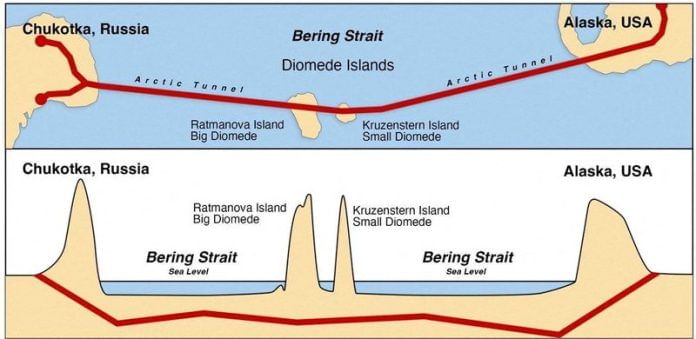By Andrew Osborn
MOSCOW (Reuters) -Russia and the United States should build a “Putin-Trump” rail tunnel under the Bering Strait to link their countries, unlock joint exploration of natural resources and “symbolise unity”, a Kremlin envoy has suggested.
The proposal by Kirill Dmitriev, President Vladimir Putin’s investment envoy and head of Russia’s RDIF sovereign wealth fund, envisages a construction project costing $8 billion, funded by Moscow and “international partners”, to build a 70-mile (112-km) rail and cargo link in under eight years.
Dmitriev, who has helped spearhead a Russian charm offensive designed to revive U.S.-Russia ties, floated the idea late on Thursday after Putin spoke to U.S. President Donald Trump by phone and agreed to meet in Budapest to seek a way to stop the war in Ukraine.
MUSK’S ‘BORING COMPANY’ PROPOSED AS CONTRACTOR
“The dream of a US–Russia link via the Bering Strait reflects an enduring vision — from the 1904 Siberia–Alaska railway to Russia’s 2007 plan. RDIF has studied existing proposals, including the US–Canada–Russia–China railroad, and will support the most viable,” Dmitriev wrote on X.
The Bering Strait, 51 miles (82 km) wide at its narrowest point, separates Russia’s vast and sparsely populated Chukotka region from Alaska. Ideas to link them have been around for at least 150 years. The small Diomede islands, one Russian and one belonging to the U.S., sit in the middle of the strait, only 2.4 miles (4 km) apart.
Dmitriev, who has struck up a relationship with Steve Witkoff, Trump’s special envoy, and suggested U.S. energy majors could join Russian projects in the Arctic, proposed that the tunnel be built by The Boring Company, a U.S. tunnel construction company owned by U.S. billionaire and sometime Trump ally Elon Musk.
“Imagine connecting the US and Russia, the Americas and the Afro-Eurasia with the Putin-Trump Tunnel – a 70-mile link symbolizing unity. Traditional costs are $65B+, but @boringcompany’s tech could reduce it to
Disclaimer: This report is auto generated from the Reuters news service. ThePrint holds no responsibility for its content.






